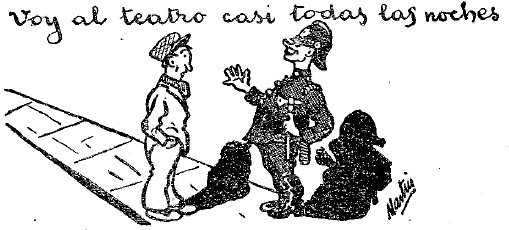
| Языки :: Испанский |
| Аудио |
 |
|
|
205 |
Español |
Spanish |
|
Lección Setenta y una (71) |
||
| No presumo de hablar como un castellano | I don't pretend to speak like a Castilian. | |
| 1 |
Ya me voy acostumbrando a la vida de Madrid, y me siento menos forastero (1). |
I am already getting used [go accustoming myself] to the life of M. and feel less foreign. |
| 2 |
Empiezo a conocer bien la ciudad; ando por todas partes, y raras veces me extravío (pierdo) (2). |
I am beginning to know the town well; I go everywhere and seldom get lost. |
| 3 |
Tengo la intención de visitar El Escorial y Aranjuez, que están próximos a (3) Madrid; dentro de quince días iré a Toledo, y luego a Córdoba y Sevilla, |
I'have the intention to visit the Esc. and Ar. which are near [at] M., in a fortnight [15 days] I shall go to T. and then to C. and S., |
| 4 |
desde donde me embarcaré para Barcelona; allí me quedaré una semana, y regresaré a Francia (4). |
(from) where I shall embark for B.; I shall stay there one week and shall go back to France. |
| 5 |
He adelantado bastante en español (5), leo mucho, hablo lo más posible; y voy al teatro casi todas las noches. |
I have made enough headway in Spanish; I read much I speak as much as
[the most] possible and go to the theatre almost every night. |
| 6 | Aun no comprendo todo, pues la lengua española es muy rica, y tiene muchos modismos que sólo se aprenden a la larga. | I don't understand everything yet, for the Spanish language is very rich, and possesses many idioms which are learnt only in the long run. |
| 7 |
Los apunto en un cuaderno de bolsillo que siempre llevo encima,
y los leo a menudo, hasta que me resultan familiares (6). |
I write them down in a pocket-book which I always have about me, and read them often, until they become [result] familiar to me. |
| 8 |
Mi pronunciación ha mejorado; aunque no puedo presumir de hablar sin acento extranjero. |
My pronunciation has improved, although I can't pretend to speak without any foreign accent. |
| 9 |
Me hago comprender sin dificultad, y esto me basta por el presente. |
I make myself understood without (any) difficulty, and this is sufficient for me for the present. |
| EJERCICIOS | EXERCISE : | |
| 1 |
¿Qué edificio es éste? — El Ayuntamiento. |
What is this building? — The town-hall. |
| 2 | ¿Tiene algo que valga la pena de visitar? | is there [has it] anything which is worth the trouble visiting? |
| 3 | Tiene un Museo, y también algunos cuadros de valor en el salen de recepciones. | There's a museum, and also a few pictures of value, in the reception hall. |
| 4 |
¿Está abierto el Museo? — No, está cerrado; |
Is the museum open? — No, it is shut; |
| 5 | se abre de diez a dos durante la semana, y hasta las cinco los domingos. | It opens from 10 to 2 in the week and until 5 on Sundays. |
| 6 |
¿Qué se cobra por la entrada? — La entrada es gratuita; |
How much do they charge [is charged] for admittance? — The admittance is free; |
| 7 | solamente en el guardarropa se cobra una pequeña cantidad. | in the cloak-room only they charge (you) a little money [sum]. |
| 8 | Es preciso dejar en él bastones, paraguas y máquinas fotográficas. | People must [it is necessary] leave sticks, umbrellas and cameras. |
| NOTES. | |
| 1 | Forastero, unknown in some place (as a stranger); extranjero, foreign. |
| 2 |
Empiezo or comienzo; ando or voy; me extravío or me pierdo (perder, to lose). |
| 3 | Próximo a or cerca de. |
| 4 |
To come, go back (from a travel) : regresar; from a walk : volver. |
| 5 |
One can say : he hecho progresos, I have made progress[es],
but it is less current. Have you made much progress? : ¿ Ha progresado (or adelantado, advanced) usted mucho ? |
| 6 |
Los apunto or anoto (apuntar, anotar); llevo encima or llevo conmigo. — Encima, on, above. — A menudo or con frecuencia. |
| Note the phrase : es preciso (praytheesso) : es necesario, es indispensable. | |
|
Our verbs. — Read the lesson again, turning die narrative into the progressive preterite : I was not pretending, I was accustoming myself, etc... Check hereunder at the same time. No presumía. — 1 — me iba — sentía. — 2 — Empezaba — andaba — extraviaba (perdía). — 3 Tenía — estaban --. In the conditional (I should go, embark, etc.) : — 4 iría — embarcaría — quedaría — regresaría. — 5 Again the progressive preterite : había — leía — hablaba — iba. — 6 — comprendía — era, tenía, aprendían. — 7 — apuntaba — llevaba — leía — resultaban —. — 8 — había — podía. — 9 — hacía — bastaba. |
